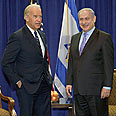
Biden: US opposes unilateral moves
After meeting with Prime Minister Netanyahu, American vice president addresses Jewish leaders, stresses his country will do all it can to fight de-legitimization campaign against Israel. He cautions both Israel, Palestinians from taking unilateral actions
Addressing an audience of thousands of Jews, Biden called on Israel and the Palestinians to avoid any unilateral moves, and stressed that although the United States was committed to Israel's security and would do all it could to prevent Iran from obtaining a nuclear weapon – peace between Israel and its neighbors must be guaranteed in the long run.
Biden spoke at the Jewish Federations of North America annual gathering in New Orleans following his 90-minute meeting with Netanyahu, which was defined as "warm". He cautioned both sides from taking unilateral actions "that will prejudice the outcome of these negotiations," and said that the US is working to renew the peace talks as soon as possible.
In his speech, Biden hinted to an Israeli construction freeze in West Bank settlements on the one hand, and the Palestinian threat to seek recognition for an independent state through the United Nations.

During an earlier meeting, Netanyahu claimed that as long as the Palestinians have the option of turning to the UN Security Council, they would not be serious in regards to the peace talks.
The prime minister told the US vice president that without direct negotiations there would be no use in discussing an agreement, and that there was a need for a peace deal with the Palestinians that would not be imposed from above but established on security arrangements on the ground in accordance with the security guaranteed.
On the backdrop of the recent deadlock in the talks, due to Israel's refusal to resume the building freeze, the Palestinians have once again raised the option of turning to international institutions and seeking unilateral recognition in a Palestinian state.
In his Sunday night speech, Biden promised the Jewish leaders that regardless of the outcome of the direct talks, "the ties between our two countries are literally unbreakable."
He stressed that the Obama administration had done more for Israel's security than any other previous US administration, noting that the current president increased the security aid to Jerusalem to support the anti-rocket defense system.
'Critical strategic relationship'
Biden stressed the strong relationship between the US and Israel, saying he felt "absolutely certain that our support for Israel must continue ... forever." He added that Netanyahu was a friend.
"I can tell you – and I'm sure he (Netanyahu) will tell you as well – that the disagreements when they existed have only been tactical in nature, they have never been fundamental," Biden said, referring to Israel's announcement during his visit that it was building 1,600 housing units in east Jerusalem.
He discussed his meeting with Netanyahu, in which the two leaders reiterated that "when it comes to Israel’s security there can be no daylight between the US and Israel."
"This administration represents an unbroken chain of American leaders who have understood this critical strategic relationship – one in which we will not yield one single inch," Biden said, adding that President Barack Obama "feels exactly the same way as I do."
Biden stressed, however, that "while the United States will continue to do whatever we can to defend Israel's legitimacy, whenever and wherever it is questioned, we all know that the only true way for it to gain the long-term security it seeks and deserves is through genuine, secure peace with its neighbors. There is no substitute for direct, face-to-face negotiations.
The vice president commended the Jewish Federations for their efforts against the de-legitimization campaign against Israel, and pledged the Obama administration’s support, saying that "efforts to chip away at Israel will only be met by unshakeable opposition by the United States."
He said that "The Jewish Federations’ recent initiative to counter de-legitimization attempts through the Israel Action Network is so important and so appreciated by the president and me."
PM: Step up military threat against Iran
Netanyahu told Biden during their meeting that he believed Israel had taken sufficient moves to demonstrate its seriousness regarding the peace talks with the Palestinians, while the other side had not done a single thing. According to the prime minister, the Palestinians' statements, conditions and excuses cast a doubt on the seriousness of their intentions.
Netanyahu presented Jerusalem's approach that Washington should include Arab countries in the talks for Israel to sense the real benefit of peace agreements in terms of economy and opening the Middle East skies to Israeli commercial flights.
During the meeting, the prime minister discussed Israel's request for security arrangements in the Jordan Rift Valley, explaining that the Jewish state did not want its eastern border to be like its northern one, where Hezbollah sits on the fence and Iranian President Mahmoud Ahmadinejad can walk along the border.
Netanyahu raised the Israeli demand to step up the threat of a military attack against Iran, claiming that such a move was the only way to convince Iran to halt its nuclear program. Both Washington and Jerusalem estimate that the economic sanctions are harming the Islamic Republic, but Israel believes that the Iranians are determined to move on with their plan as long as the military option seems unrealistic.
During his speech to the Jewish leaders, Biden discussed continued administration efforts to curtail Iran’s drive to build nuclear arms, highlighting the aggressive sanctions regime that he said had already kept some foreign investors from working with the Islamic Republic.
Attila Somfalvi contributed to this report
- Follow Ynetnews on Facebook










